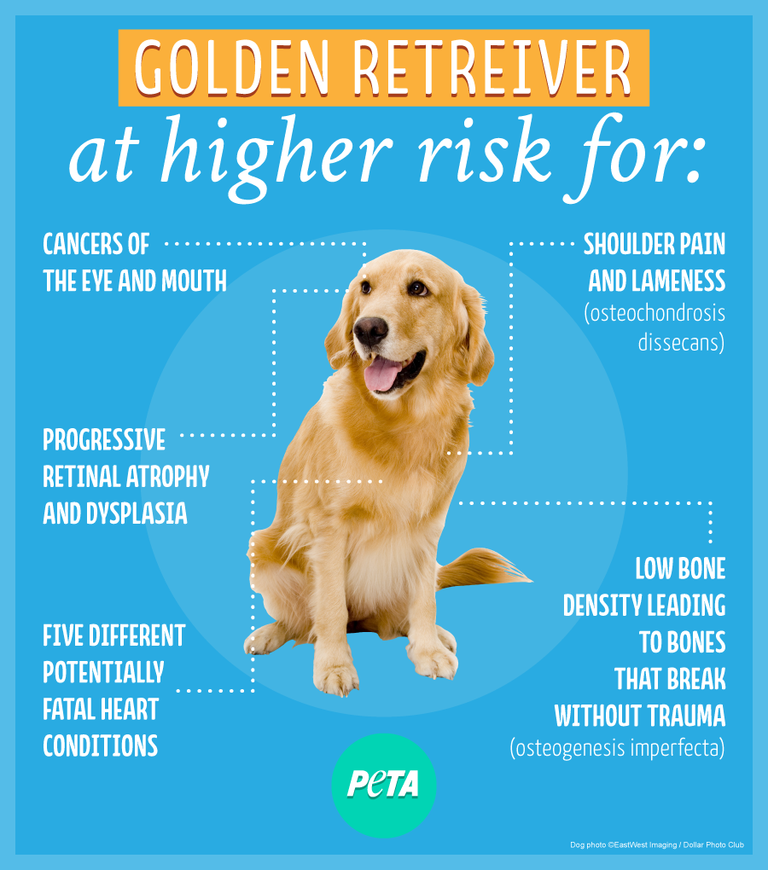Curious about golden retriever’s health and potential issues? Wonder no more! In this article, we’ll dive into the question, “Do golden retrievers have problems?” and explore the common challenges these lovable pups may face.
Let’s face it, every dog breed has its share of concerns, and golden retrievers are no exception. Although they’re renowned for their friendly and outgoing nature, these furry companions may encounter a few health issues throughout their lives. However, with proper care and attention, many of these challenges can be managed effectively.
So, if you’re a golden retriever enthusiast or considering adding one to your family, buckle up! We’re about to embark on a journey into the world of golden retriever health and uncover the truths behind their potential problems. So, let’s get started!

Do Golden Retrievers Have Problems?
Golden Retrievers are beloved dogs known for their friendly and gentle nature. However, like any other breed, they may also face certain challenges or health issues. In this article, we will discuss some common problems that Golden Retrievers may experience and provide insights into how to address them. Whether you are a current Golden Retriever owner or considering getting one, understanding these potential problems can help you provide the best care for your furry friend.
Common Health Issues in Golden Retrievers
Golden Retrievers are generally healthy dogs with a lifespan of around 10-12 years. However, they are prone to certain health conditions that owners should be aware of. These issues can sometimes be genetic, so it is important to choose a reputable breeder who performs necessary health screenings. Let’s explore some of the common health problems that Golden Retrievers may encounter:
1. Hip Dysplasia
Hip dysplasia is a common skeletal condition in dogs, including Golden Retrievers. It occurs when the hip joint develops improperly, leading to pain, lameness, and eventually arthritis. While genetics play a role, factors such as rapid growth or obesity can exacerbate the condition. Regular exercise, a balanced diet, and maintaining a healthy weight can help minimize the risk of hip dysplasia in Golden Retrievers.
In severe cases, surgery may be required to correct the misalignment of the hip joint. Consult with a veterinarian if you notice any signs of hip dysplasia, such as difficulty standing up, stiffness, or a bunny-hopping gait.
2. Cancer
Golden Retrievers have a higher likelihood of developing cancer compared to many other breeds. The most common types of cancer seen in Golden Retrievers are lymphoma, mast cell tumors, and hemangiosarcoma. To detect cancer early, it is important to conduct regular veterinary check-ups and keep an eye out for any abnormal lumps, sores, or changes in behavior. If cancer is detected, treatment options such as surgery, chemotherapy, or radiation therapy may be recommended.
3. Subaortic Stenosis (SAS)
SAS is a congenital heart condition that affects the flow of blood from the heart to the aorta. It is more commonly found in large dog breeds, including Golden Retrievers. Depending on the severity of the condition, SAS can cause heart murmurs, exercise intolerance, or even sudden death. Regular cardiac examinations and echocardiograms can help detect SAS early on. While there is no cure for SAS, medication or surgery may be prescribed to manage the symptoms and improve the dog’s quality of life.
The Importance of Regular Veterinary Check-Ups
Regular check-ups with a veterinarian are crucial for maintaining the health and well-being of your Golden Retriever. During these visits, the vet can perform thorough examinations, administer necessary vaccinations, and conduct screenings for potential health issues. Early detection and intervention can greatly improve the prognosis for many conditions.
Tips for Keeping Your Golden Retriever Healthy
While Golden Retrievers may be prone to certain health issues, there are steps you can take to keep them healthy and thriving:
1. A Nutritious Diet
Feed your Golden Retriever a balanced diet that provides the necessary nutrients for their age, size, and activity level. Consult with a veterinarian to determine the best diet for your dog and avoid overfeeding, as obesity can contribute to various health problems.
2. Regular Exercise
Golden Retrievers are an active breed that requires regular exercise to maintain physical and mental well-being. Engage in activities such as walks, runs, or play sessions to keep them active and prevent weight gain.
3. Grooming and Dental Care
Regular grooming, including brushing their luscious coat and cleaning their ears, can help prevent skin infections and other issues. Additionally, prioritize dental hygiene by brushing their teeth regularly and scheduling professional cleanings as needed.
Training and Socialization For Golden Retrievers
Golden Retrievers are known for their friendly and sociable nature. However, they still require appropriate training and socialization to become well-rounded and obedient companions. Here are some key considerations:
1. Basic Obedience Training
Teach your Golden Retriever basic commands like sit, stay, and heel. This not only helps them become well-behaved but also ensures their safety in different situations. Positive reinforcement techniques, such as treats and praise, work well with this breed.
2. Socialization
Expose your Golden Retriever to various people, animals, and environments from an early age. This helps them develop good social skills and prevents behavioral problems. Enrolling them in puppy classes or playdates can also boost their confidence and help them interact appropriately with other dogs.
3. Mental Stimulation
Golden Retrievers are intelligent dogs that thrive with mental stimulation. Provide them with interactive toys, puzzle feeders, and training sessions that engage their minds. This helps prevent boredom and the development of destructive behaviors.
In conclusion, Golden Retrievers may face certain health problems, but with proper care, regular veterinary check-ups, and a healthy lifestyle, many potential issues can be prevented or managed effectively. Remember to provide a balanced diet, regular exercise, and ample mental stimulation to keep your Golden Retriever happy and healthy for years to come.
Key Takeaways: Do Golden Retrievers Have Problems?
- Golden Retrievers are prone to certain health issues.
- They may develop hip dysplasia, a condition affecting the hip joints.
- Golden Retrievers can also suffer from heart problems.
- They are susceptible to allergies, including food allergies.
- Some Golden Retrievers may experience separation anxiety.
Frequently Asked Questions
Golden Retrievers are popular and beloved family pets. While they are generally healthy dogs, like any breed, they can have certain health issues. Here are some common questions about potential problems that Golden Retrievers may experience.
Q: Are Golden Retrievers prone to hip dysplasia?
A: Yes, unfortunately, hip dysplasia is a common problem in Golden Retrievers. It is a hereditary condition where the hip joint doesn’t develop properly, leading to joint instability and arthritis. While it can be genetic, environmental factors like rapid growth and excessive exercise can contribute to its development. Regular exercise, a balanced diet, and proper weight management can help reduce the risk of hip dysplasia in Golden Retrievers.
Q: Can Golden Retrievers have allergies?
A: Yes, Golden Retrievers can have allergies just like humans. They can be allergic to certain foods, dust mites, pollen, or other environmental triggers. Common signs of allergies in dogs include itching, redness, sneezing, and digestive issues. If you suspect your Golden Retriever has allergies, consult with a veterinarian who can help determine the specific triggers and recommend a suitable treatment plan.
Q: Do Golden Retrievers often develop cancer?
A: Unfortunately, Golden Retrievers have a higher risk of developing cancer compared to some other breeds. They are particularly prone to lymphoma, hemangiosarcoma, and mast cell tumors. Regular veterinary check-ups and early detection are crucial in managing cancer in Golden Retrievers. It’s important to be vigilant about any lumps, changes in behavior, or other abnormal signs and consult with a veterinarian if you have concerns.
Q: Are Golden Retrievers prone to ear infections?
A: Yes, Golden Retrievers are prone to ear infections due to their floppy ears and their love for water. Moisture and debris can get trapped in the ear canal, creating a breeding ground for bacteria and yeast. Regular ear cleaning, proper drying after bathing or swimming, and avoiding excessive moisture can help prevent ear infections. If you notice your Golden Retriever scratching their ears frequently, shaking their head, or showing signs of discomfort, it’s important to have their ears checked by a veterinarian.
Q: Do Golden Retrievers often develop heart problems?
A: Golden Retrievers can be prone to certain heart conditions, such as mitral valve disease and dilated cardiomyopathy. These conditions can affect the proper functioning of the heart and may lead to symptoms like coughing, difficulty breathing, and fatigue. Regular cardiac check-ups and an appropriate diet can help manage and potentially prevent heart problems in Golden Retrievers. If you notice any concerning symptoms, it’s important to consult with a veterinarian for proper diagnosis and guidance.

9 Most Common Health Problems In Golden Retrievers
Summary
Golden Retrievers can be prone to a few health issues. These include hip dysplasia, cancer, and allergies. Regular vet check-ups, a balanced diet, exercise, and proper grooming can help keep your Golden Retriever healthy and happy. They make great family pets and are known for their friendly and gentle nature.
However, it’s important to remember that not every Golden Retriever will have health problems. With love, care, and proper attention, these beautiful dogs can live long and joyful lives as cherished members of your family. So if you’re thinking of getting a Golden Retriever, don’t worry too much about the potential health issues. Focus on providing a loving and healthy environment for your furry friend.
